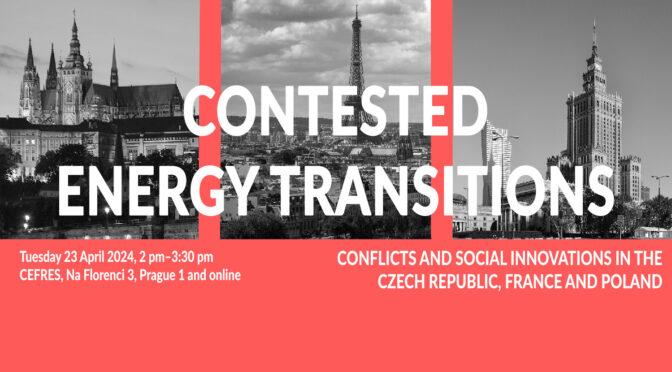
Contested Energy Transitions.
Conflicts and Social Innovations in the Czech Republic, Poland, Germany, and France
Kick-off meeting of a research project developed within AV ČR–CNRS TANDEM Program by the Czech Academy of Sciences, Charles University and CNRS, at CEFRES.
When: Tuesday 23 April 2024, 2 pm–3:30 pm
Where: CEFRES, Na Florenci 3, Prague 1 and online (to get the link, please register at cefres@cefres.cz)
Language: English
With the participation of the project coordinators:
et de
The meeting will be opened by:
- Mr. Tomáš KOSTELECKÝ, Member of the Academy Council, Czech Academy of Sciences
Presentation
Gilles Lepesant, Martin Durdovic, and Krzysztof Tarkowski will present this project in energy social research. The project aims to better understand transition resistance and stakeholder conflicts arising from the adoption of EU energy transition policies and to identify new patterns in energy governance that will help overcome these challenges. The research is based on a comparative approach between countries and focuses on case studies at the local or regional level.
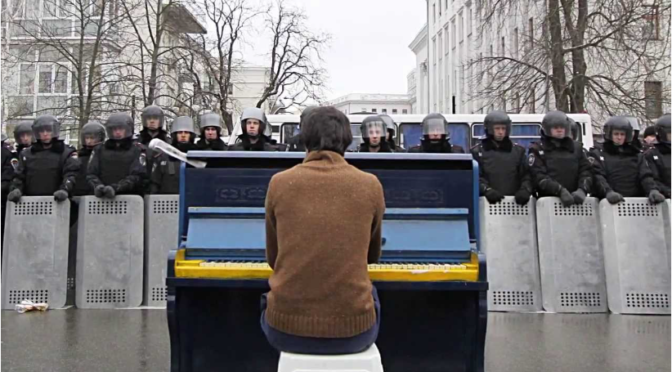
A Subaltern That Sings.
From Sound Resistance to Musical Diplomacy in Wartime Ukraine
Kick-off meeting of a research project developed within CU-CNRS TANDEM Program supported by Charles University, CNRS and CEFRES.
Date: April 9, 2024, from 2 pm to 3:30 pm CET
Location: CEFRES, Na Florenci 3, Prague 1
Language: English
Project Coordinators:
Valeria KORABLYOVA (CEFRES / Faculty of Social Sciences, Charles University) and
Louisa MARTIN-CHEVALIER (CEFRES / Sorbonne University)
The meeting will be opened by:
- Mr. Stéphane CROUZAT, Ambassador of France to the Czech Republic
- Mr. Ladislav KRIŠTOUFEK, Vice-rector for Research, Charles University
- Mr. William BERTHOMIÈRE, director for European and international affairs at CNRS Sciences humaines et sociales
Abstract
Valeria Korablyova and Louisa Martin-Chevalier will present this research project dedicated to the musical dimension of Ukrainian resistance as a vehicle for escaping the subaltern position of a double periphery in the blind spot between the EU and Russia. The project brings together two academic subfields – cultural diplomacy and postcolonial studies – to reveal how Ukrainian musicians and activists use musical means to increase their visibility on a global level and to raise their country’s geocultural status on the mental maps of international audiences. From the European opera scene to the Eurovision Song Contest, Ukrainians deploy their soft power to manifest their country’s agency and garner international support for their cause.
Since 2018, the TANDEM program endeavors excellency in social sciences and humanities by bringing together Czech and French colleagues to intensify scientific collaboration between our countries in the frame of European Research Area. The program is a joint initiative of CEFRES, CNRS SHS, CU & the Czech Academy of Sciences (AV ČR) in the frame of the CEFRES Platform of scientific collaborations. Its former members have obtained two ERC grants, including the BOAR project.
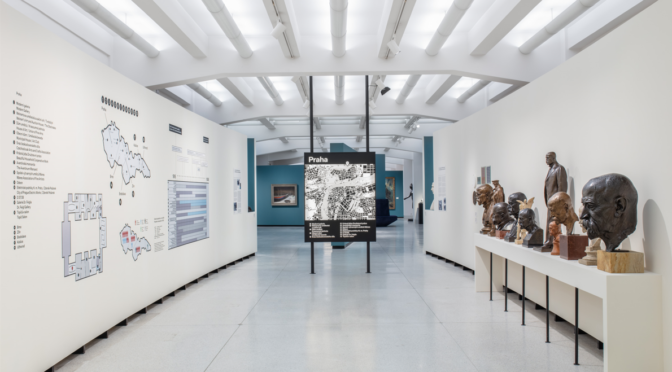
Museums and their narratives
Is the « national » label a thing from the past?
A roundtable discussion organized within a new cycle of meetings Résonnances / Rezonance by the Institute of Philosophy of the Czech Adacemy of Sciences, CEFRES, the French Institute in Prague, and the National Gallery in Prague
Date: March 12, 2024, 5:00–6:30 pm
Location: Trade Fair Palace (Veletržní palác), National Gallery Prague Dukelských Hrdinů 47, Prague 7 (Auditorium, 6th floor)
Language: French and Czech with simultaneous translation
Participants
Sébastien ALLARD (Director of the Paintings Department, Musée du Louvre),
Danièle COHN (Professor of esthetics and philosophy of art, Université Paris I),
Milena BARTLOVÁ (Professor of art history, Academy of Arts, Architecture, and Design in Prague – UMPRUM)
& Anna PRAVDOVÁ (Curator of the Modern collections, National Gallery Prague – NGP)
Chair: Lara BONNEAU (philosopher, Institute of Philosophy of the Czech Adacemy of Sciences – FLÚ AV ČR)
Abstract
Continue reading Museums and their narratives →
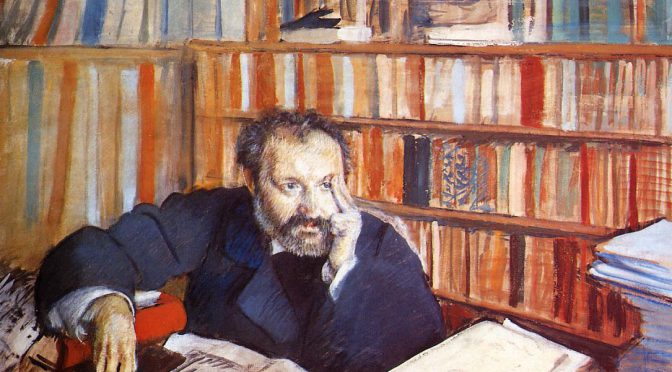
Philosophy of Science and Science and Technology Studies through the Lens of Technology
Roundtable
Date: 30 November–2 December 2023
Location: Institute of Philosophy, Czech Academy of Sciences, Jilská 1, Prague 1 (Conference room, 1st floor) / CEFRES, Na Florenci 3, Prague 1
Language: English
Organizers: CEFRES, Institute of Philosophy of the Czech Academy of Sciences (FLÚ AVČR).
Argument
On the international scene, the separation between ‘STS’ and philosophy of science seems more marked than ever. Since the great controversies between relativists and realists in the 1980s and the Science Wars of the 1990s, the two communities have drifted far apart, and in a sense beyond dissensus. However, a good part of STS specialists could benefit from a philosophical perspective on their work, and vice versa, philosophers of science from a better understanding of problems that have long haunted the history and sociology of science as well as STS. Continue reading Philosophy of Science and Science and Technology Studies →
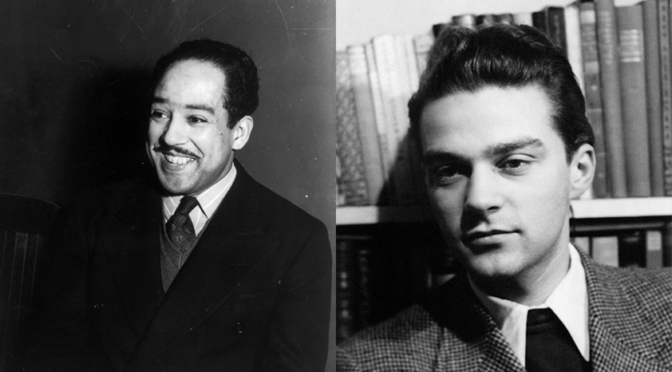
What were the intertextual relationships between the African American poet Langston Hughes and the Czech poet Ivan Blatný? How did Blatný employ English in his poetry, how did Hughes use references to Czechoslovakia? How do poets and poems move across languages and power blocs and what were other literary relationships between the Czech lands and the African American cultural community? And what roles does translation play here? These are some of the questions we will be discussing with Julie Hansen, Charles Sabatos, and Justin Quinn. The discussion, co-organized by the Institute of Czech Literature and CEFRES, will take place in English (or rather, it will move between English and Czech) and will be moderated by Františka Schormová. Continue reading Ivan Blatný, Langston Hughes: Translation, Transnationality, and the Blues →

 Round table discussion about Ronan Hervouet‘s book: The Suspended Revolution. Belarusians against the authoritarian state, published by Éditions Plein Jour.
Round table discussion about Ronan Hervouet‘s book: The Suspended Revolution. Belarusians against the authoritarian state, published by Éditions Plein Jour.
Date and location: April 28th, 4:30pm at CEFRES and online (contact cefres[@]cefres.cz for the Zoom link)
Organizers: CEFRES and Courrier d’Europe centrale
Language: French
While Belarus has been frozen for twenty-five years under the influence of an authoritarian regime ruled with an iron fist by Alexander Lukashenko, there is hope for a change as the 2020 presidential election approaches. Since August and the following months, the citizens rose en masse. They denounce the large-scale electoral fraud and demand the departure of the dictator. The struggle is intense, the period, revolutionary. The whole state and police structure is shaking. But the movement comes to an end because of a fierce and extensive repression. Hundreds of thousands of people flee abroad.
Continue reading “Belarus: The Suspended Revolution” →







 Round table discussion about
Round table discussion about